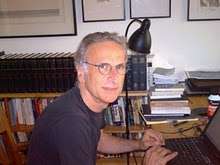Martin Bunzl
Martin Bunzl (born 1948, in London, England) is professor of philosophy at Rutgers University in New Brunswick NJ, where he directed the Rutgers Initiative in Climate and Social Policy from 2007 to 2011.

Biography
Bunzl graduated from the University of Minnesota, from which he obtained a BA and a Ph.D. His early work dealt primarily with causation, in which he developed a deflationary account of causal overdetermination; what David Lewis called "Bunzl events".[1]
In the Philosophy of History, Bunzl's focus has been on the ontological commitments of historians, including their use of counterfactuals.[2] Natalie Zemon Davis, author of The Return of Martin Guerre and Society and Culture in Early Modern France, has written of Martin Bunzl's Real History: [the book] "provides a breath of fresh air in writing on the philosophy and epistemology of history. In language accessible to historians, philosophers, and the reading public more generally, he explores the questions posed by the various 'turns' of the post-war decades: deconstructive, linguistic, literary, anthropological, and quantitative. He looks not just at what historians say about their methods, but at what they actually do." [3]
With a specialty in the Philosophy of Science, he is the author of The Context Of Explanation[4] and Real History[5] and co-editor of Buying Freedom[6] and Foundational Issues in Human Brain Mapping,[7] as well as numerous scholarly articles.
Bunzl is currently examining the experimental methodology and ethics of geoengineering.[8]
Publications
Scholarly
- "Geoengineering Harms and Compensation", Stanford Journal of Law, Science & Policy, Vol. 4, 2011, pp. 69–75.
- “A Test for Geoengineering?”, Science, Vol. 237, 2010, pp. 530–531 (with Alan Robock, Ben Kravitz, and Georgiy L. Stenchikov.)
- “Geoengineering Research: Shouldn’t or Couldn’t?”, Environmental Research Letters, Vol. 4, 2009, pp. 1–3.
Popular
- Ulysses and the Hedge Trimmer, The Washington Post, Jan. 1, 2008.
External links
References
- David Lewis, Philosophical Papers, Volume II, Oxford: Oxford University Press, 1987, p. 210
- “Counterfactual History: A User’s Guide”, American Historical Review, Vol. 109, 2004, pp. 845-858.
- Amazon.com https://www.amazon.com/Real-History-Reflections-Historical-Philosophical/dp/0415159628.
- The Context of Explanation, Dordrecht: Kluwer Academic, 1993.
- Real History, London: Routledge, 1997.
- Buying Freedom: The Ethics and Economics of Contemporary Slave Redemption, edited with Anthony Appiah, Princeton: Princeton University Press, 2007.
- Foundational Issues of Neuroimaging, edited with Stephen Hanson, Cambridge: MIT Press, 2010.
- Princeton University, Ethics and Climate Change, "Archived copy". Archived from the original on 2012-08-21. Retrieved 2012-08-18.CS1 maint: archived copy as title (link)